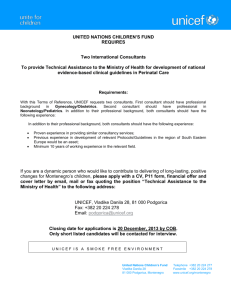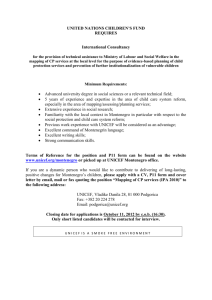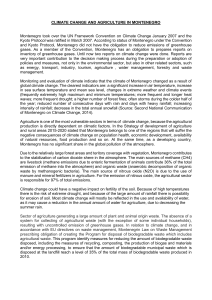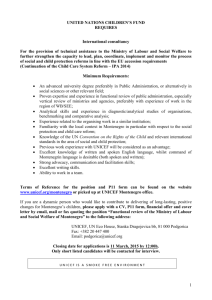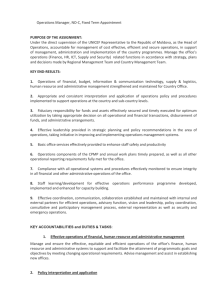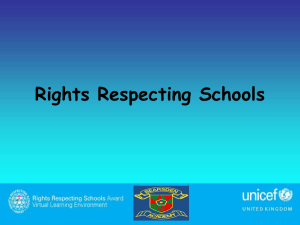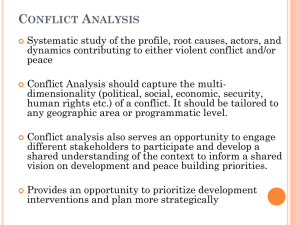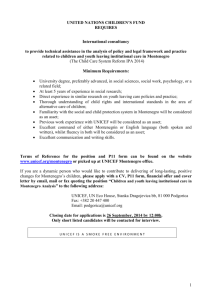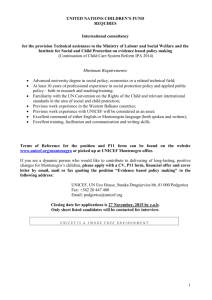International Expert
advertisement
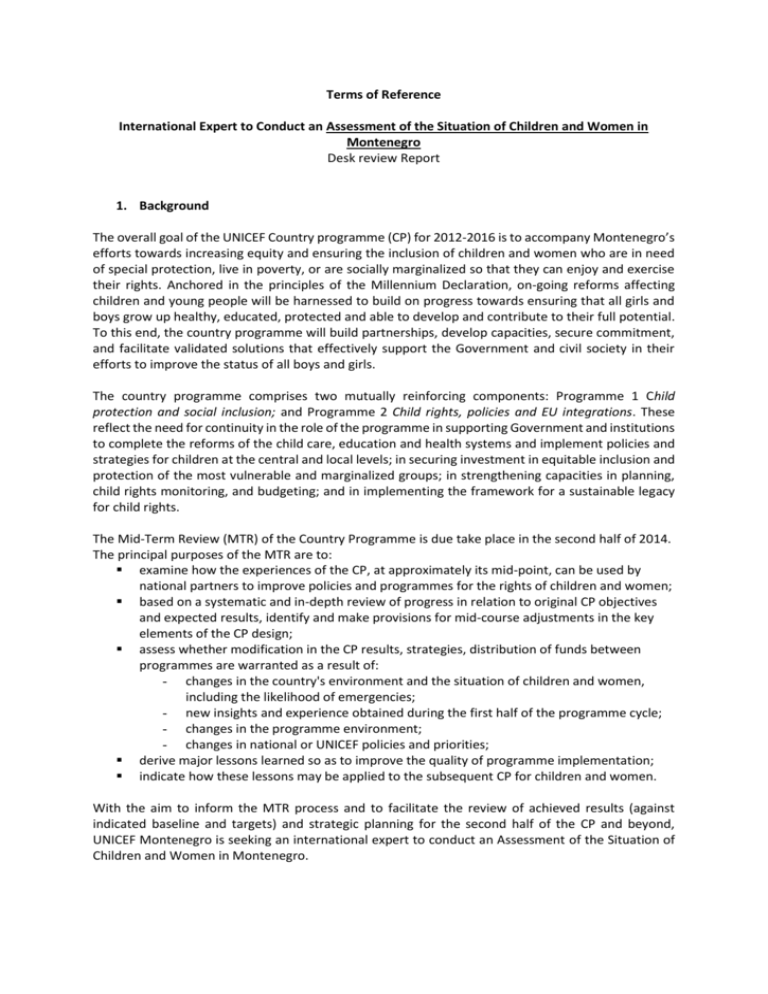
Terms of Reference International Expert to Conduct an Assessment of the Situation of Children and Women in Montenegro Desk review Report 1. Background The overall goal of the UNICEF Country programme (CP) for 2012-2016 is to accompany Montenegro’s efforts towards increasing equity and ensuring the inclusion of children and women who are in need of special protection, live in poverty, or are socially marginalized so that they can enjoy and exercise their rights. Anchored in the principles of the Millennium Declaration, on-going reforms affecting children and young people will be harnessed to build on progress towards ensuring that all girls and boys grow up healthy, educated, protected and able to develop and contribute to their full potential. To this end, the country programme will build partnerships, develop capacities, secure commitment, and facilitate validated solutions that effectively support the Government and civil society in their efforts to improve the status of all boys and girls. The country programme comprises two mutually reinforcing components: Programme 1 Child protection and social inclusion; and Programme 2 Child rights, policies and EU integrations. These reflect the need for continuity in the role of the programme in supporting Government and institutions to complete the reforms of the child care, education and health systems and implement policies and strategies for children at the central and local levels; in securing investment in equitable inclusion and protection of the most vulnerable and marginalized groups; in strengthening capacities in planning, child rights monitoring, and budgeting; and in implementing the framework for a sustainable legacy for child rights. The Mid-Term Review (MTR) of the Country Programme is due take place in the second half of 2014. The principal purposes of the MTR are to: examine how the experiences of the CP, at approximately its mid-point, can be used by national partners to improve policies and programmes for the rights of children and women; based on a systematic and in-depth review of progress in relation to original CP objectives and expected results, identify and make provisions for mid-course adjustments in the key elements of the CP design; assess whether modification in the CP results, strategies, distribution of funds between programmes are warranted as a result of: - changes in the country's environment and the situation of children and women, including the likelihood of emergencies; - new insights and experience obtained during the first half of the programme cycle; - changes in the programme environment; - changes in national or UNICEF policies and priorities; derive major lessons learned so as to improve the quality of programme implementation; indicate how these lessons may be applied to the subsequent CP for children and women. With the aim to inform the MTR process and to facilitate the review of achieved results (against indicated baseline and targets) and strategic planning for the second half of the CP and beyond, UNICEF Montenegro is seeking an international expert to conduct an Assessment of the Situation of Children and Women in Montenegro. 2. Purpose and Objective The primary purpose of this consultancy is to conduct an analytic Desk Review of key reports, studies, surveys, strategies and evaluations produced in the last 3 years in the area of children rights in Montenegro, either by UNICEF or other governmental, non-governmental and development partners that will be used to inform the MTR process between the Government of Montenegro and UNICEF. Objectives of the Assessment 1. Based on the review of literature, identify: - key inequities affecting children and women in the country, key determinants and underlying causes; - key bottlenecks and barriers preventing realization of their rights; 2. Suggest possible strategic interventions for the second half on the CP implementation and beyond. 3. Methodology and Technical Approach The Assessment will identify key inequities affecting children, their magnitude, who and where are the most affected children and what are the underlying causes of identified inequities. The desk review will also look at existing or lacking mechanisms to address these issues. The desk review should as much as possible focus on gathering data on the hardest-to-reach, applying an equity focus and a gender lens. Special attention will be paid to the situation of the most marginalized and disadvantaged groups. Whenever possible, data presented in the report should be disaggregated, by economic quintile, geographic area, gender and age. Analysis of the above elements should allow the consultant to make specific recommendations for future possible actions of UNICEF and make a significant contribution to national knowledge of children and women in Montenegro. The Report is also aimed at providing an important reference for policy-making process in the areas of children wellbeing. The Assessment will consist of the following: 1. Desk review of documents, studies, reports, evaluations and strategies; 2. Analysis of available administrative and survey data. 3. In-depth interviews with Programme Staff 4. 1-day workshop with programme staff to have their feedback on the initial conclusions of the desk review List of Studies/Research/Reports/Strategies/Evaluations and data sources to be used (list is not exhaustive): UNICEF 1. Child Poverty Study (2012) 2. Children in Montenegro (Report based on Census 2011) 3. Civil registration of children in MNE (2011) 4. 5. 6. 7. 8. 9. 10. 11. 12. 13. 14. 15. KAPs on Children with Disabilities – ‘It’s about ability’ (2010, 2011, 2012, 2013) Mid-Term Evaluation of the “Social Welfare and Child Care System Reform" IPA (2013) Assessment of Perinatal Care in Montenegro (2013) Study on Obstacles to Education: Focus on Roma and Egyptian Children (2013) KAP on Fostering and Adoption (2013, 2014) Study on Investing in ECE in Montenegro 2013 Montenegro MICS Final Evaluation of the Child Care System Reform component of the “Social Welfare and Child Care System Reform" Project (2013) Final Evaluation of the Justice for Children Project (2014) UNICEF Country Programme and Action Plan (2012-2016); UNICEF Annual Reports (2012, 2013); KAP on Violence Against Children (2013); National and International Partners 1. National Plan of Action for Children 2014-2017 2. Strategy for the development of the social and child protection system in Montenegro 2013-2017; 3. National Strategy for Development of Fostering and Action Plan 2012-2016; 4. Strategy on Inclusive Education 2008-2012 and 2014-2018 5. Strategy on Improving the Status of Roma and Egyptians in Montenegro 2012-2016 6. EU Progress Reports for Montenegro 7. PISA 2012 and National Report on PISA 2012 results 8. Official Gazette of Montenegro 9. NHDR reports 2009 and 2013 (UNDP) 10. National MDG progress reports 2010, 2011, 2012, and 2013 11. CRC Concluding Observations for MNE (2010) 12. MNE CEDAW Concluding observations for MNE 13. Poverty analysis in MNE 2006-2013 (Monstat) 14. Montenegro, The World We Want - Post-2015 national consultations in MNE (UNDP, 2013) 15. UN IGME Child mortality reports, data for MNE (2006-2013) 16. Establishing and incentive compatible last-resort social assistance scheme in MNE (WB, 2012) 17. Western Balkans Safety Nets Report (WB, 2012) 18. MONTENEGRO, After the Crisis: Towards a Smaller and More Efficient Government, Public Expenditure and Institutional Review, World Bank 2011 Data Sources 1. National and local Child Protection Databases (disaggregated data) 2. Judicial Information system (PRIS) – data on children coming in contact with the justice system 3. Ministry of Education Information System (MEIS) 4. MONSTAT Statistical Yearbooks 5. Institute of Public Health (IPH), Statistical Yearbooks 4. Activities and tasks The consultant is expected to: Be responsible for the drafting and finalizing the Assessment. The Assessment will contain the following sections: 1) Key inequities affecting children and women, elaboration of key determinants and underlying causes, 2) priority strategic areas and recommendations for UNICEF’s actions; 3) Knowledge gaps in priority issues for children; In-depth interviews with UNICEF Programme Staff Liaise with UNICEF Programme staff and its partners in preparation and finalization of the Assessment; Facilitate an internal workshop of programme staff to have their feedback on the initial conclusions of the desk review. The consultant will use the outcomes and main conclusions of the Workshop with UNICEF staff to refine initial conclusions of the Desk Review analysis. The Workshop is an opportunity to engage all staff in reflecting on the future vision of UNICEF for the next half of the Country Programme. 5. Main deliverables 1. A draft report by 10 June 2014; 2. A final report which will include comments and feedback of the supervisor and main conclusions of the Workshop on the first version, by 30 June 2014. 6. Management and Coordination The consultant will report to and be supervised by Programme Specialist. The consultant will also work in close collaboration with the M&E focal point and other Programme Officers as required. The contract duration will be from 1 May until 30 June and will include 23 working days: - 7 days: 2 days: 10 days: 1 day: 3 days: Desk review (home-based) In-depth interviews with Programme Staff (home-based) Report writing (home-based) Facilitate a 1-day workshop for UNICEF Programme staff to present initial findings. Incorporate comments and finalize the report (home-based). 7. Qualification or Specialized Knowledge/Experience and competencies required The selection of the consultant will be based on the following minimum qualifications criteria: Advanced university degree in development studies or other relevant discipline. A minimum of 5 years of experience in international development, with specific focus on strategic planning, RBM, inter-agency coordination and communications. Ability to think analytically, synthesize and clearly present complex processes and issues to heterogeneous audiences. Excellent writing skills in English - ability to write in a structured, lucid and concise manner. Knowledge of the UN system guidelines and methodologies is an advantage. Knowledge of the socio-cultural and economic context of Montenegro. Ability to work under tight deadlines. Start Date and Deadline for submission The start date of the contract is 1 May 2014. Draft report will be submitted by 10 June 2014, Final Report and all other end products to be submitted by 30 June 2014. UNICEF reserves the right to withhold all or a portion of payment if performance is unsatisfactory, if work/outputs is incomplete, not delivered or for failure to meet deadlines. All materials developed will remain the copyright of UNICEF and that UNICEF will be free to adapt and modify them in the future. Budget and Remuneration The total duration of the consultancy is 23 working days over the period from 1 May 2014 to 30 June 2014. As indicated above, the request for services under this contract will require the candidates to indicate their fee for the services to be provided. As part of the selection process, the office will select the consultant that quoted the lowest fee from the list of candidates who are deemed suitable for achieving all tasks in time, and as per the criteria and deliverables stipulated in the Terms of Reference. Payment schedule The fee will be paid in one (1) instalment, upon the submission of the deliverables. Recourse UNICEF reserves the right to withhold all or a portion of payment if performance is unsatisfactory, if work/outputs is incomplete, not delivered or for failure to meet deadlines.



